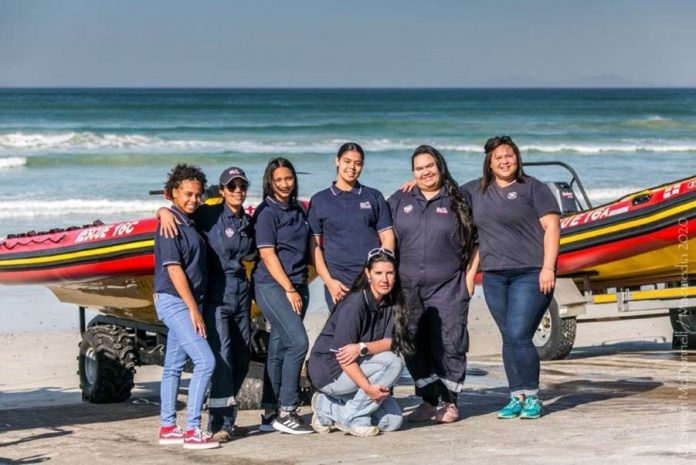
Sunday, 9 August is celebrated as Women’s Day in South Africa but it is also duty day at the National Sea Rescue Institute’s (NSRI) base in Strandfontein in Cape Town and that is where you will find most of the women of Station 16 – on duty.
“This is what we do,” came the reply when asked how they would be celebrating Women’s Day.
Station 16 has one of the largest female contingents (11) of any NSRI base across South Africa and the women, ranging in age from 17 to over 50, are part of a strong family bond at the base which serves to protect the popular but notorious stretch of surf line.
The women form an integral part of the non-profit organisation which is dedicated to saving lives on South African coastal and inland waters and was founded by pioneer Patti Price in 1966, following the tragic deaths of fishermen off Still Bay.
The women of Station 16 see gender as no differentiator. “We, as females, are also able and fit to save lives out at sea,” said crew member Keena Swartbooi, 19.
She had been a lifeguard candidate at Strandfontein Surf Lifesaving Club when she first became interested in NSRI.
“What drew me to the service is the fact that in September 2015, I lost a family member to the ocean and the Hermanus NSRI crew were the ones that recovered his body, as well as other casualties,” she said.
“This flamed my passion for wanting to join the NSRI and save lives, because they gave us a chance to at least mourn the death of my uncle and have a burial ceremony. This made me realise that I also want to be able to give back to the community in serving with the NSRI crew.”
Bilqees Kyzer, 29, said: “If you want it badly enough and put in the work you can achieve anything you commit to, despite one’s gender.”
Seventeen-year-old Michaela Leo, still a matric pupil, added: “As women, we are generally seen as the ‘inferior gender’ when it comes to physical work. However, that is just a mindset. The physical strengths of what is required out at sea is stereotyped because it is seen as only men who are capable and physically strong. I would encourage more women to volunteer and join our rescue team because it not only about physical strength, but how driven you are to want to make a difference or impact in society.”
Most of the women at Station 16 are driven by a deep desire to pour back into their communities.
Kyzer, a Class 4 Coxswain which allows her to operate and pilot rescue vessels with a single motor and no navigational lights, grew up on the beach as a baby whose father Clint Abrahams was involved with Sea Rescue all the years, whilst her and her siblings did lifesaving.
“I always had a passion to help people generally and what better capacity to fulfil that role than in the maritime application.”
Nicky Whitehead, 44, and CEO of a company in the safety sector, grew up doing volunteer work in homes for the disabled, orphanages, and rehabilitation centres in Pretoria.
“When I relocated to Langebaan I joined Station 4 as a volunteer and transferred to Strandfontein when I moved to Muizenberg,” she said. ”When volunteering is part of your existence there is no getting away from it. You will always find a way to add value to your community.”
Crew member Charnelle Hare, 19, came to the NSRI by word of mouth.
“I’ve always wanted to be a part of something great. I’ve always been a humanitarian, but it’s so much more than just a word. Saving lives and being able to hopefully give someone a second chance at life is beyond extraordinary.”
The women at Station 16 perform a wide variety of roles and duties, from checklists, radio communications, maintenance of vessels and, of course, heading out to sea to save people in distress.
All have completed the intensive NSRI basic training before becoming permanent members and have gone to acquire additional skills sets.
Shore controller Ilhaam Adams said: “I started in September 2015, became crew, attended the Fire Fighting course, received my radio license, and am currently busy with Bravo Bravo on e-learning.
“I also attended a crew Development course, as well as a 4×4 course, and I was also voted Shore supporter for 2019 by my station.”
A scholar driver and caregiver, Adams added: “Now with the career path, we are set for greatness, not only in our NSRI fields, but also in our personal capacity.”
Two of the other younger female members, Toni Zill, 21, and Faatin Samodien ,17, have their career paths mapped out and feel volunteering at the NSRI adds to their personal growth and development.
Zill is studying marine sciences and works for an organisation called I Am Water, while Faatin, still in Grade 11, is working to towards becoming a veterinarian.
“We are like a family, especially at station 16,” Zill said. “You learn a lot of new things and you are never not learning.”
Leo added, “We are different people from different communities who have the same mission – to save lives. The NSRI not only gives you the opportunity to make a difference and give back to society, but also opens various doors in life and helps you gain experience in various things.”

